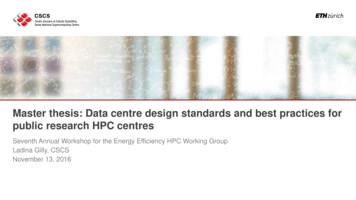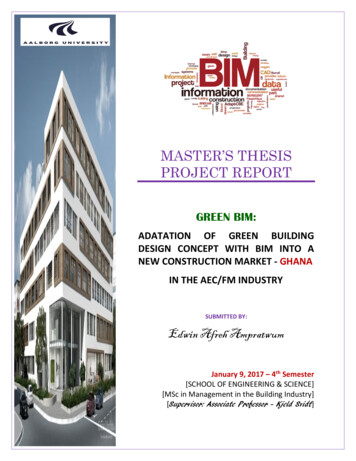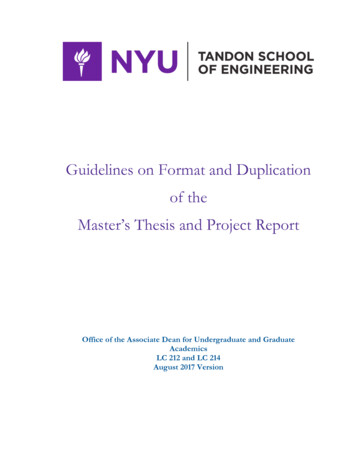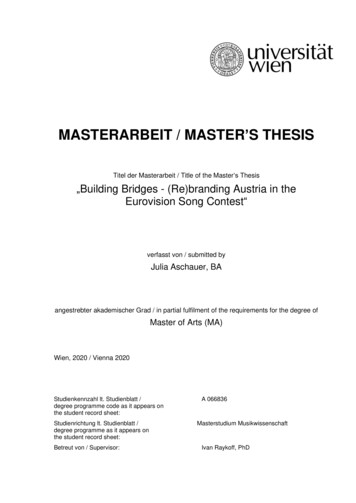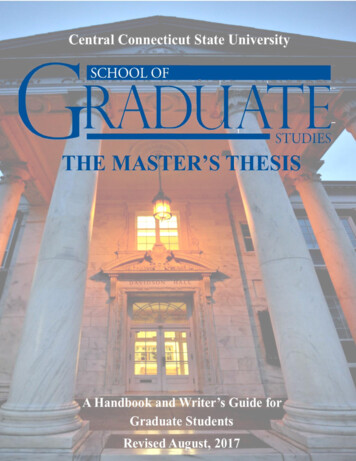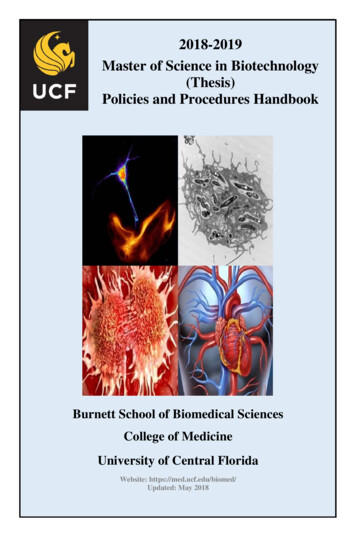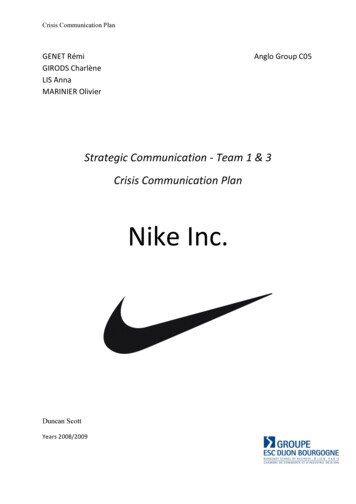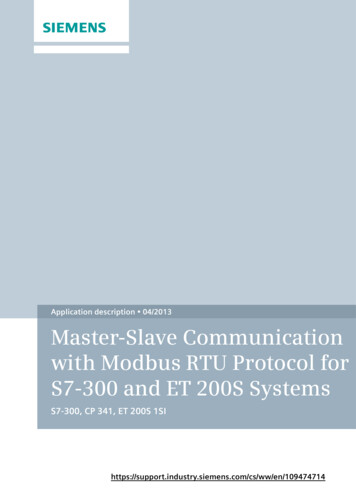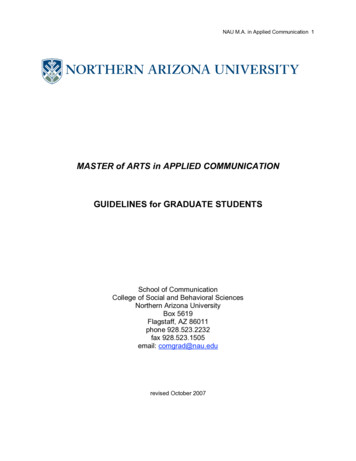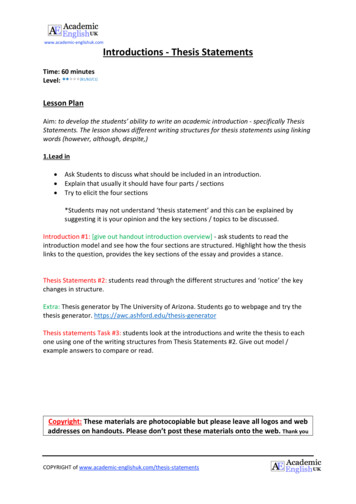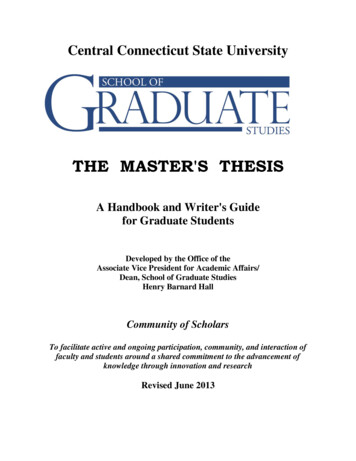
Transcription
Central Connecticut State UniversityTHE MASTER'S THESISA Handbook and Writer's Guidefor Graduate StudentsDeveloped by the Office of theAssociate Vice President for Academic Affairs/Dean, School of Graduate StudiesHenry Barnard HallCommunity of ScholarsTo facilitate active and ongoing participation, community, and interaction offaculty and students around a shared commitment to the advancement ofknowledge through innovation and researchRevised June 2013
THE MASTER’S THESISA Handbook and Writer’s Guide for Graduate StudentsTable of ContentsIntroductionChapter 1What is a Thesis? Quantitative vs. Qualitative Statistical ProfileChapter 2The Thesis Process Do’s and Don’ts for Selecting a Topic Steps in the Thesis Process Thesis Advisor Five Key Issues: Time, Cost, Access, Faculty, Support & Approval Human or Animal Subjects Effective Strategies Oral Presentation or DefenseChapter 3University Policies and Procedures Registering for the Thesis Continuing Registration (CREG) Fee Thesis Committee Thesis Proposal Sample Thesis Outlines Use of Human Subjects or AnimalsThesis Style Requirement Thesis Cover Page Abstract Cover Page Guidelines for Writing an Abstract Margins Paper Quality Biographical Note Policies Regarding Approval of Thesis Digitized/Electronic Submission Capstone Rubric Thesis DeadlinesChapter 4Specific Department Requirements Department Requirements Examples of Outstanding ThesesReferencesPage12614172228
Table of Contents (Continued)AppendicesAppendix A: Graduate Capstone Course Registration Form29Appendix B: Thesis Checklist30Appendix C: Capstone Rubric31Appendix D: Description of the Human Studies Council and theInstitutional Animal Care and Use Committee32Appendix E: Institutional Animal Care and Use CommitteeApplication for Project Approval34Appendix F: Approval of Thesis Proposal45Appendix G: Approval of Thesis46Appendix H: Sample Thesis Cover Page47Appendix I: Sample Abstract Cover Page48Appendix J: Sample Abstract49Appendix K: Sample Biographical Statement51Appendix L: Thesis Reproduction Approval Form52Appendix M: Application for Graduation53
IntroductionCongratulations! You are going to write a Master's thesis, a demanding and intellectuallychallenging task. As one of the capstone experiences of graduate study at Central ConnecticutState University, the Master's thesis signifies a rite of passage. You will learn and practice theskills required for organized research and documentation, analysis of information and effectivewritten communication. You are making the transition from one who is a consumer ofknowledge to one who actively contributes to the knowledge base of their discipline. You arebecoming part of the Graduate Studies Community of Scholars by advancing knowledge throughyour research.This handbook is prepared so that students may successfully complete their thesis work. Itcontains an overview of the thesis process, from start to finish, as well as specificthesis requirements of individual departments. It has four chapters. Chapter 1 defines what athesis is, while Chapter 2 provides an overview of the thesis process-the steps one must takefrom the initial conceptualization of a possible thesis idea to the finished project. The thirdchapter discusses specific standards required by the School of Graduate Studies to guide studentsthrough the thesis process. Chapter 4 enumerates specific departmental requirements. Becauseyou cannot register for the Thesis online, Appendix A is needed during the period of registration.In order for you to get credit for your Thesis, the capstone registration form must be signed andsubmitted to the Graduate Studies Office. Additional appendices are also included: Appendix Bprovides a checklist on all items that must be included at the time of submission; Appendix Ccontains the rubric developed and approved by the Graduate Studies Committee meant to informyou of some of the criteria by which your thesis will be assessed. Other appendices includeimportant information on the Human Studies and the Institutional Animal Care and UseCommittee (Appendices D & E) as well as samples of forms and documents that are needed foryour thesis, from your first registration to the final submission of your thesis.Thank you to Professor Marc Goldstein of the Psychological Science Department for his help inpreparing the first iteration of this handbook. Thank you also to members of the GraduateStudies Committee for their dedication to upholding the standards and quality of CCSU’sgraduate programs.While every effort will be made to keep this Handbook up-to-date, please confer with yourgraduate advisor about any recent changes that may have taken place. You may also contactSchool of Graduate Studies, located in Barnard 102 and at 860-832-2363, if you have questions.Writing a thesis takes time, hard work, and patience. Nonetheless, you should find it to be aworthwhile and rewarding endeavor. Many faculty members, along with the School of GraduateStudies staff, are ready to support you. I wish you successful completion of your thesis work.Dr. Paulette LemmaAssociate Vice President of Academic Affairs/Dean, School of Graduate Studies1
Chapter 1What is a Thesis?Preparing a Master's thesis is a time-honored tradition in academe, yet many students whoare about to undertake such a project have only the vaguest notion of what a thesis entails.Students also may perceive the thesis as a formidable process; yet it does not need to be the case.All theses should be based on the compilation of knowledge and skills acquired throughout thestudent’s graduate program.However, no single definition of a thesis exists. What constitutes an appropriate thesis variesconsiderably between disciplines and even between faculty members within a discipline. Giventhis lack of uniformity regarding what a thesis is (and the resulting anxiety it invokesin students!), how can we describe a thesis? Here are four common characteristics.First, a thesis is an exercise in research. You are asked to demonstrate your skills in usingthe methodologies of your field to examine a topic of interest to your discipline.What constitutes research methodology varies widely across fields. For example, in thephysical sciences, research often (but not always) involves the use of experimental proceduresin a laboratory setting; in the humanities, research may involve a descriptive or interpretativeanalysis of some piece of literature; and in the social sciences, research may involve surveysor field studies.Various academic departments have identified examples of good Master's theses written byCentral Connecticut graduate students in Chapter 4, Table 4-2. You may want to look at thecomplete thesis (available in the Reserve Room of the Burritt Library) to get a better idea of thetypes of methodologies used. In addition, more recent theses have their abstracts posted on theElihu Burritt Library Internet Services (www.ccsu.edu; Click on Library and find Theses &Dissertations). Theses that are numbered from 1,480 onward include their abstracts, which willhelp you then locate examples of full theses in the Reserve Room that approximate your area ofinterest. In addition, as of Spring 2002 semester, all students submitted digital copies of theirtheses and indicated their permission to include the thesis on the University Web Server,providing access to the complete thesis through the library’s CONSULS.A topic of interest to your discipline means an area of research that is generally viewed asfruitful by other researchers in the field. Within any discipline there are typically many subfields of interest. Research activities, such as a thesis, usually focus on a limited area,exploring a very specific issue or question. Again, looking at the titles of the theses listed inChapter 4 will give you an idea of the specificity of the typical thesis.A second characteristic of a thesis is that, no matter what the topic or methodology used, theintent of the research is to make a contribution to the field. A contribution is any “new”information that you can give to your discipline. This can take many forms: a test of a newtheory, a reinterpretation of an old poem, or an evaluation of a curriculum.2
The list is endless, but the common element is this: an addition to the knowledge base of yourfield requires you to have an in-depth understanding of some particular area of your discipline.And, you must know the current "state of the art" if you are to add to it.In this regard, a thesis represents the capstone activity of your graduate degree program. Tocomplete it successfully, you must demonstrate mastery over both a specific content area ANDthe methodology of your discipline. Indeed, the Master's degree has traditionally identified oneas both an intelligent consumer of information and as a contributor to the field of study.Third, a thesis represents an opportunity to work closely with one or more faculty membersin your field. One characteristic of good graduate education is the opportunity for faculty andstudents to work together in a close relationship characterized as mentoring. While much of thecontent of any field can be taught in traditional classes, there is always some art to anydiscipline. These nuances are best conveyed in the context of a close working relationship.Working on a thesis under the tutelage of faculty provides an opportunity for learning that is notalways found in other graduate school activities.The fourth and final characteristic of a thesis is more personal in nature: A thesis is an exercise inself-discipline. Completing a thesis requires sustained initiative and focus for an extended periodof time. Unlike classes, there are no fixed times which you must meet or specific deadlinesimposed by the instructor. YOU provide the structure. The choice of topic and faculty advisorsis largely yours. Indeed, faculty will generally look to you to be the initiator of your thesis work.A Master's degree acknowledges you as a professional in your field, and the mark of aprofessional is the ability to be self-motivated and self-directed.To recap, a thesis is a written document that entails an independent research activity undertakento explore some puzzle, problem or topic of interest to the field. The goal of this activity is toadd new knowledge to the discipline and to demonstrate competency and worthiness of anadvanced degree in the field.Quantitative versus Qualitative ThesesQuantitative research studies typically yield statistical analyses of numerical data. Quantitativeapproaches--those that use “quantitative data obtained from samples of observations in orderto help make decisions to accept or reject hypothesized relationships between groups orclasses of subjects” (Rudestam & Newton, 1992, p. 24)--have been pre-eminent. Thomas (2003)describes quantitative research as “the current status of people and events in terms of amount andfrequencies” (p. 41). Three common types of quantitative methods involve surveys, correlationanalyses, and experiments.Qualitative approaches deal with the “meaning of things” (Lincoln & Guba, 1985). There is“greater emphasis on holistic description--that is, on describing in detail all of what goes on in aparticular activity or situation, rather than on comparing the effects of a particular treatment (asin experimental research), or on describing the attitudes or behaviors of people (as in surveyresearch)” (Wallen & Fraenkel, 2001, p. 432-433). In this way qualitative approaches are3
“verbal portrayals of the current status of people and events in terms of kinds of characteristicsand actions” (Thomas, p.33). Case studies, ethnographies, and narrative experiences are just afew methods associated with qualitative research. Qualitative approaches involve clear standardsregarding the documentation of observations and their interpretation.Studies also may combine research methods that include both types of quantitative andqualitative research (Thomas, 2003).A Statistical Profile of Recent Master's ThesesThe above description of “what is a thesis?” may have helped somewhat, but many studentsabout to embark on a thesis have concerns about the “nuts and bolts.” Questions foremost on theminds of many students are: How long should it be? How many references should it have?To help address these concerns, a statistical profile of some recent theses done at CCSU has beencompiled. Table 1 below is based on an examination of 104 Master's theses completed between1999-2007. (Please note that this is an informal study and does not include all theses completedduring this period but only those available in the Burritt Library Reserve Room at the time theseswere examined.)Table 1Average Number of Pages and ReferencesofTheses from 2002-2010Average TotalNumber of Pages82.18Average Total Number ofPages Excluding Appendices66.96Average NumberOf References48.55These figures represent an average across all disciplines. When theses are listed by discipline1(see Table 2), we can see that there are noticeable differences in length between fields. Pleasenote that there is not an automatic correlation between thesis length and/or number ofreferences and thesis quality! These figures are only to provide a preliminary frame-of-reference.4
Table 2Average Number of Pages and ReferencesofTheses by Discipline(2002-2010)Discipline (N)2Art Education (6)Biology (16)Biomolecular Sciences(15)Communication (5)Criminal Justice (17)English (14)Geography (10)2Ave. Numberof 038.2425.4790.0038.2997.8065.50History (9)105.6770.78International Studies (9)102.8995.67Mathematical Sciences(17)44.2425.00112.6080.40Psychological Science(11)44.4554.91Reading (4)49.0030.75Modern Languages (5)1Ave. Total Number of PagesExcluding AppendicesOnly disciplines with at least 4 theses were included in the second table.Number of theses.5
Chapter 2The Thesis ProcessThis section attempts to describe, in some detail, the sequence of steps one goes through inplanning, executing and writing a thesis.Listed in Figure 2-1 are major steps in the thesis process. While the tabular presentation impliesa linear progression, in fact, it rarely happens that way. For example, students could be selectinga thesis advisor (and perhaps other committee members) while they are identifying and/orrefining their thesis idea. For ease of presentation, however, steps are discussed in the ordershown.The first and often most difficult step for many students is selecting a thesis idea. Many studentsexpect that a thesis topic should suddenly come to them as a result of their own reflection. Whileat times this does happen, a more common process is that a person first identifies a general topicarea and, then, following more examination of that area and consultation with his/her advisor, thestudent begins to focus more specifically on a topic that is appropriate for a thesis.Thus, the first step is to identify a general research area that you would like to pursue. Thesources of this research area are several: it may represent an area in which you have had a longstanding interest; it may be a topic you found stimulating in one of your classes; it may arisethrough discussions with instructors, your advisor, or classmates; it may come from readingcurrent books or journals in your field; or it may come from some organization or group that hasdesignated this topic of interest or a problem.Some Do's and Don'ts for Selecting Thesis Topics11. Do choose an idea that can sustain your interest over a long period of time.2. Do write down interesting ideas, thoughts and quotations as you come across them inyour readings as well as notes on discussions with faculty and peers, etc.3. Do not choose topics that are overly ambitious. No thesis will be the final word onany particular topic. As one student put it: There are two types of theses: the greatones and the ones that are completed.4. Do not go it alone. Coming up with a topic is a negotiated effort between you andyour advisor. Regularly talk with your advisor about your ideas.1adapted from Rudestam & Newton, 1992.6
Figure 2-1Steps in the Thesis Process-------------------------------Choosing a Research Area--------------------------------- ing/Refining a Thesis Idea------------------------------------------- -Selecting a Thesis Advisor and ---------- ---------------------------------Preparing and Submitting a Thesis Proposal--------------------------------- ---------------------------------Human Studies Council or IACUC Approval (As required by Thesis Topic)--------------------------------- ------------------------------Conducting the Research------------------------------ ----------------------------Interpreting the Results---------------------------- ----------------------Completing the Written Thesis---------------------- --------------------------Oral Defense of Thesis¹-------------------------- ----------------------------------------Submitting the Thesis for ot required by all Departments, see Table 4-17
Once you've identified a general problem area in which you are interested, you will need torefine it into a specific, workable project. A key part of this process will involve a criticalliterature review of the field. This review will do several things: (1) make you aware of thecurrent "state of the art" and knowledge base of the area; (2) help you begin to identify the gaps,i.e., what key issues or questions around this topic need to be explored; and (3) inform you aboutthe kinds of methodologies that have been used to explore aspects of this topic. Keeping goodnotes on the material you read (including all information needed for a proper bibliographiccitation in the thesis style utilized in your department) will help you when you write your thesisproposal.Today, almost all literature searches begin with (but are not limited to!) electronic searchtechniques. All major abstracts (e.g. Psychology Abstracts, Periodical Abstracts, Index Medicus)are computerized and can be searched via author, subject, and/or keywords. A completedescription of how to use the various electronic databases is beyond the scope of this manual, butBurritt Library provides specific instructions on using the many databases on Consuls and in thereference section (third floor) of the library, as well as regularly offering classes in searchtechniques. Please consult with the reference librarian for further information.As you read through the literature, you will gain a better understanding of what is known aboutyour topic and key unanswered questions. Indeed, some people have likened the thesis processto a large jigsaw puzzle with a piece missing. Your research is to help fill in the gap in yourfield.At this point, it is advisable to begin discussing your thesis idea with faculty in your department.If you have not already done so, you also want to identify a thesis advisor who will be veryhelpful as you determine the suitability of a potential topic. Suitability refers not only to thequality of the idea, but to logistical considerations that will have an impact on your ability tocomplete the thesis. Indeed, students often have good research ideas which, for a variety ofreasons, they may be unable to carry out. Five key issues to consider: (1) time, (2) cost, (3)access to needed resources, (4) faculty support and (5) approval.The first consideration is time: How long will the project take? A thesis should represent asubstantial effort on one's part, but it is not expected to be one's life work. While there are nohard and fast guidelines, a thesis project (once a workable idea is developed) should take nomore than 12 months. Many theses are done in considerably less time, but sometimes takec
Studies Committee for their dedication to upholding the standards and quality of CCSU’s graduate programs. While every effort will be made to keep this Handbook up-to-date, please confer with your graduate advisor about any recen
